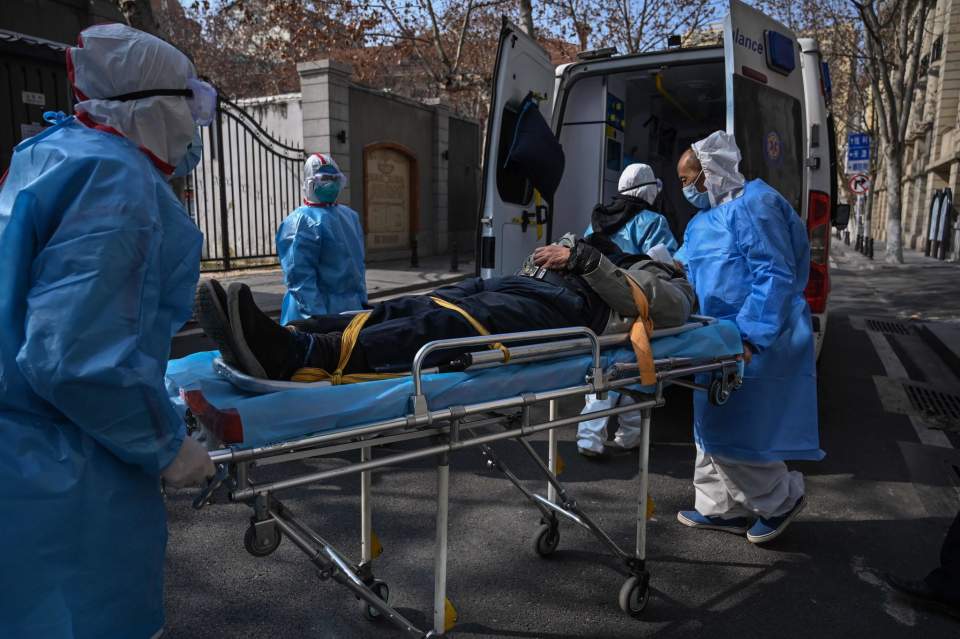The United States set its advisory at Level 4, which represents the highest safety risk. The World Health Organization said the virus represents a risk outside of China.
State Department tells Americans not to travel to China.
The State Department on Thursday night issued a travel advisory telling Americans not to travel to China because of the public health threat posed by the coronavirus. Secretary of State Mike Pompeo confirmed the travel advisory on Twitter.
The department set the new advisory at Level 4, or Red, its highest caution, which is reserved for the most dangerous situations.
W.H.O. declares the coronavirus outbreak a global health emergency.
The World Health Organization declared on Thursday that the new coronavirus outbreak was a global health emergency, acknowledging that the disease represents a risk outside of China, where it emerged last month.
The declaration — officially called a Public Health Emergency of International Concern — serves notice to all United Nations member states that the world’s top health advisory body rates the situation as serious.
Countries can then decide whether to close their borders, cancel flights, screen people arriving at airports or take other measures.
The decision came as cases have begun to appear in people who had not traveled to China during the outbreak.
Italy had a false alarm. And it canceled all flights to China.

Prime Minister Giuseppe Conte announced in a Thursday night news conference that Italy had blocked all flights to and from China as the country confirmed its first cases of the coronavirus.
The government announced the country’s first two confirmed cases during the news conference. Officials said they would investigate the movements of the two people, Chinese tourists, and try to identify those they may have been in contact with.
The news capped a tense day in Italy, after thousands of passengers had been blocked from leaving a cruise ship that docked at an Italian port for more than 12 hours over concerns that someone aboard might have had the virus. That episode was ultimately a false alarm.
A Chinese national with a fever later tested negative for the coronavirus and the Italian authorities said that passengers were allowed to disembark.
American Airlines pilots’ union is suing to stop some flights to China.

The American Airlines pilots’ union said on Thursday that it was suing the airline in an attempt to halt all service between the United States and China, citing “a threat to the safety of passengers and flight crew.”
In a statement, the union, the Allied Pilots Association, said it was instructing its members to turn down requests to fly to China.
The airline had previously announced that, because of declining demand, it would suspend flights from Los Angeles to Beijing and Shanghai starting on Feb. 9. Service from Dallas to those cities is expected to continue.
In another development, United Airlines on Thursday announced a new wave of cancellations affecting hundreds of flights through the end of March. The cutback, a response to declining demand, will reduce the number of daily flights from 12 to four from its United States hubs to Beijing, Hong Kong and Shanghai.
In all, the reduction includes 332 round trip cancellations between Feb. 9 and March 28.
U.S. reports its first case of person-to-person transmission.

Health officials on Thursday reported the first case of person-to-person transmission of the new coronavirus in the United States.
The patient is the husband of a woman who was the first reported case in Chicago, officials said at a news briefing. The woman, who is in her 60s, had returned from Wuhan, China, the epicenter of the virus. She was hospitalized but appears to be doing well, said Dr. Jennifer Layden, an epidemiologist at the Illinois Department of Public Health.
Her husband, who had not traveled to China, recently began showing symptoms and was immediately isolated in the hospital. Lab tests have now confirmed that he was infected with the coronavirus, Dr. Layden said.
Health officials are tracking the places visited by both patients and identifying all close contacts to monitor them. The public is at low risk, officials said.
Person-to-person transmission may occur if someone who is sick breathes, talks, coughs or sneezes in the vicinity of others. Respiratory droplets carrying the virus may then travel from the sick person to other people or surfaces.
Based on the transmission patterns seen in China and other countries, experts have expected to see some person-to-person spread in the United States, said Dr. Robert Redfield, director of the Centers for Disease Control and Prevention. “We understand that this may be concerning,” Dr. Redfield said. “But our assessment remains that the immediate risk to the American public is low.”
The disease is not spreading widely in the U.S. and people who have not had close contact with someone who recently traveled to China are unlikely to get infected.
213 people have died. About 9,800 cases have been confirmed.

◆ Forty-three more deaths in China were announced early Friday, bringing the toll to 213.
◆ Nearly 2,000 new cases were recorded in China in the past 24 hours, raising the worldwide total to nearly 9,800, according to Chinese and World Health Organization data. The vast majority of the cases are inside China; 98 cases have been confirmed in 18 other countries.

◆ Tibet has reported its first confirmed case. This means that all of China’s provinces and territories have now been touched by the outbreak.
◆ Thailand has reported 14 cases of infection; Japan has 11; Hong Kong and Singapore have 10; Taiwan has eight; Australia, Malaysia and Macau each have seven; France and the United States have six; South Korea, Germany and the United Arab Emirates each have 4; Canada has three; Vietnam and Italy each have two; and India, the Philippines, Nepal, Cambodia, Sri Lanka and Finland each have one.
◆ Confirming India’s first case, the government said the patient, in the southern state of Kerala, was a student at Wuhan University. It said arriving passengers with a history of travel to China were being screened at 20 airports, up from seven earlier in the week.
◆ Cases recorded in Taiwan, Germany, Vietnam, Japan and France involved patients who had not been to China. There have been no reported deaths outside China.
As the virus spreads, so has anti-Chinese sentiment.

In Japan, the hashtag #ChineseDon’tComeToJapan has been trending on Twitter.
In Singapore, tens of thousands of residents have signed a petition calling for the government to ban Chinese nationals from entering the country.
In Hong Kong, South Korea and Vietnam, businesses have posted signs saying that mainland Chinese customers are not welcome.
And in France, a front-page headline in a regional newspaper warned of a “Yellow Alert.”
At a time when China’s rise as a global economic and military power has unsettled its neighbors in Asia as well as its rivals in the West, the coronavirus is feeding into latent bigotry against the people of mainland China.
“Some of the xenophobia is likely undergirded by broader political and economic tensions and anxieties related to China, which are interacting with more recent fears of contagion,” said Kristi Govella, an assistant professor of Asian studies at the University of Hawaii, Manoa.
The effects of the outbreak are rippling through the arts world.

With China’s emergence as a major cultural market in recent years, the effects of the coronavirus outbreak quickly rippled through the arts world.
The Boston Symphony Orchestra announced Thursday morning that it was canceling a tour of Asia that had been scheduled to begin next week. The Hong Kong Philharmonic called off a pair of Beethoven concerts this weekend under the baton of its music director, Jaap van Zweden, who holds the same post at the New York Philharmonic, after its venue was closed. Film shoots were shut down; movie premieres postponed; a dozen concerts by the Cantopop star Andy Lau were canceled; and some prominent galleries were calling for Art Basel Hong Kong, the prestigious international art fair scheduled for March, to be canceled.
The Boston Symphony called off its tour, which was to have featured the pianist Yefim Bronfman, after learning that one of the halls it planned to play at, the Shanghai Oriental Art Center, had canceled its performances, and amid rising concerns about the spread of the virus.
Tours are hugely expensive undertakings for large symphony orchestras, and the Boston Symphony, which does not carry insurance for tour concert interruptions, will now begin discussions about costs with various vendors — including for its flights, cargo, and hotels — as well as with the concert presenters.
The National Symphony Orchestra, of Washington, is scheduled to perform in Beijing and Shanghai with its music director, Gianandrea Noseda, after several dates in Japan.
Gary Ginstling, the orchestra’s executive director, said that the orchestra had been conferring with government officials, presenters and medical experts as it monitors the situation.
The U.S. commerce secretary sees a silver lining in China’s woes.

Commerce Secretary Wilbur Ross said on Thursday that China’s loss might be America’s gain, because the coronavirus outbreak could prompt employers to move jobs to the United States.
“I don’t want to talk about a victory lap over a very unfortunate, very malignant disease,” Mr. Ross said in an interview on Fox Business. “I think it will help to accelerate the return of jobs to North America. Some to the U.S., probably some to Mexico as well.”
Mr. Ross cited previous disease outbreaks in China, suggesting that a prevalence of diseases there would become a factor in businesses leaving the country and relocating to North America.
“You had SARS, you have the African swine virus there, now you have this,” Mr. Ross said.
His remarks may be seen as insensitive to a country in crisis, and he has faced such criticism in the past. During the government shutdown in early 2019, Mr. Ross suggested that furloughed workers should take out loans while they went without pay for more than a month.
Russia orders partial closure of its border with China and limits visas.

Russia prepared for a partial closure of its 2,600-mile border with China as fears about the coronavirus outbreak mounted in Moscow.
Prime Minister Mikhail Mishustin on Thursday ordered 16 of the approximately 25 crossing points that Russia operates on the Chinese border to be closed as of midnight local time. He said the closures would be part of a new raft of measures to stop the infection from spreading to the country from Russia’s southeastern neighbor.
Russia’s Foreign Ministry urged Russians to postpone all travel to China and suspended the issuance of electronic visas for Chinese citizens.
Russian officials say that no cases of coronavirus infection have been confirmed in Russia.
“We have to do everything to protect our people,” Mr. Mishustin said in televised remarks at a cabinet meeting. “We will inform everyone about the relevant actions being taken to close the border in the Far Eastern region and other measures being taken by the government.”
Wuhan residents lashed out over handling of the outbreak.

Anger and frustration have escalated in Wuhan, the center of the outbreak, as the city’s overwhelmed hospitals pleaded for urgent help to replenish diminishing supplies.
A relative of a coronavirus patient assaulted a doctor at a hospital in Wuhan, pulling and damaging the doctor’s mask and protective clothing, the state broadcaster CCTV reported on Thursday, citing the local police. The Beijing Youth Daily, a state-owned newspaper, reported that two doctors had been attacked at the hospital, including one who was threatened and had his protective gown torn off.
In the face of rising public anger, the central government has sought to present itself as intervening to hold accountable local officials in areas that have been hit hard by the epidemic.
CCTV aired footage on Thursday showing a central government inspection team grilling officials in Huanggang, a city about 50 miles from Wuhan, about the number of beds they had set aside for coronavirus patients. As the two local health officials fumbled their responses to seemingly basic questions, the visiting inspectors’ questions took on a more impatient tone.
Unusual in its blunt portrayal of inadequate government response, the report was quickly shared on Chinese social media sites with the hashtag “one question, three don’t knows.”
Officials say medical supplies are running dangerously low in central China, despite gear being delivered in bulk from around the world. The Huazhong University of Science and Technology in Wuhan wrote on Weibo, a social media platform, that the city had received 240,000 masks, 25,000 protective gowns and 4,000 pairs of medical goggles from its alumni group in Germany. The Chinese community in Singapore sent 75,000 medical masks.
Photographs posted online showed hospital workers, many still in protective gear, slumped over their desks and on the floors in exhaustion.
In eerily quiet Wuhan, few people are venturing out except for food.

Since the central Chinese city of Wuhan went under official lockdown last week, most shops have shut, few cars venture onto the roads and fear has kept most people in their homes.
When Wuhan residents do step outside, it’s mostly to the supermarkets, food stores and pharmacies that have stayed open as part of a government effort to sustain the city. Senior officials have promised that residents need not worry about supplies of vegetables, fruit or other staples, even as large swaths of the province, Hubei, are also locked down to curtail the outbreak.
Yet Wuhan residents complained about price hikes, and expressed fear that a prolonged shutdown might choke off food supplies. Poorer people, both in urban Wuhan and in the countryside, would suffer more acutely from tightening supplies.
“If we can’t bring in produce, it will become more expensive, or we might even have to close up,” said Zuo Qichao, who was selling piles of cucumbers, turnips and tomatoes. As he spoke, a woman accused him of unfairly raising the turnips’ price.
“Every county, every village around here is now putting up barriers, worried about that disease,” Mr. Zuo said. “Even if the government says it wants food guaranteed, it won’t be easy — all those road checks.”
Anger in Taiwan as China refuses its evacuation request.
In Taiwan, anger has been growing over China’s refusal this week to let Taiwan evacuate about 300 of its people from Wuhan, even as it has given the United States, Japan and other countries permission to do so.
China’s ruling Communist Party considers Taiwan, a democratically governed island, to be part of China, and the two sides have no formal ties. Referring to the rebuffed evacuation request on Tuesday, Ma Xiaoguang, a spokesman for China’s Taiwan Affairs Office, said in a statement that Taiwanese people in Hubei Province, which includes Wuhan, were receiving “appropriate care.”
Kolas Yotaka, a spokeswoman for Taiwan’s government, said China was prioritizing politics over lives. Many of the Taiwanese seeking evacuation from Wuhan were tourists or on business trips, while others were residents of the city who suffered from chronic diseases, Ms. Kolas said.
“We call on the Chinese government to demonstrate basic humanity and agree to our request as soon as possible,” she said.
As part of its campaign to isolate Taiwan diplomatically, China has blocked it from participating in international bodies like the World Health Organization — a fact that has also angered Taiwanese people this week, as they try to prepare along with the rest of the world for the possibility of a worsening epidemic.
Investors dump stocks and buy gold on coronavirus fears.

Fears that a fast-moving virus in China could impact the global economy drove investors in Asia to dump stocks on Thursday.
Money fled riskier assets like stocks and oil and flowed instead into investments that are considered safe havens, like gold, as growing numbers of policymakers, economists and corporate executives sounded alarms. Major benchmarks across the region fell by more than 1 percent. China’s markets remain closed for an extended holiday until Feb. 3.
Brent crude oil, the international benchmark, hit its lowest price this year before paring some of its losses. It was trading at about $59 a barrel.
European markets finished higher, and the S&P 500 closed up 0.3 percent.
A growing number of companies have warned they will have to close or shift operations and could take a financial hit from widespread business disruptions in China.




